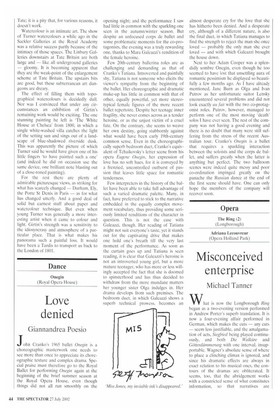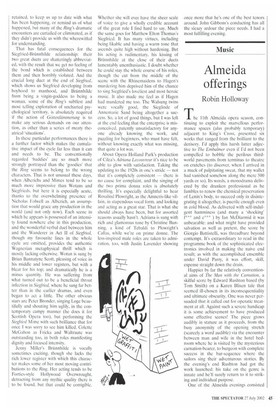The Ring (2) (Longborough) Adriana Lecouvreur (Opera Holland Park)
Misconceived enterprise
Michael Tanner
What is now the Longhorough Ring began as a two-evening version performed in Andrew Porter's superb translation. It is now a four-evening affair performed in German, which makes the cuts — any cuts — seem less justifiable, and the amalgamation of acts, Siegfried being played continuously, and both Die Walietire and Ge5tterdiimmerung with one interval, insupportable. Wagner's absolute sense of where to place a clinching climax is ignored, and since his dramatic effects are always in exact relation to his musical ones, the contours of the dramas arc obliterated. It seems, too, that the abridgement works with a constricted sense of what constitutes information, so that narratives are
retained, to keep us up to date with what has been happening, or remind us of what happened, but many of the Ring's dramatic encounters are curtailed or eliminated, as if they didn't provide us with the wherewithal for understanding.
That has fatal consequences for the Siegfried-BrOnnhilde relationship: their two great duets are shatteringly abbreviated, with the result that we get no feeling of the bond which is established between them and then horribly violated. And the crucial long duet at the end of Siegfried, which shows us Siegfried developing from boyhood to manhood, and Briinnhilde from being a virgin-goddess to being a woman, some of the Ring's subtlest and most telling exploration of uncharted psychological territory, is absolutely required if the action of Cidlierdammetung is to make any serious demands on our attention, as other than a series of meaty theatrical 'situations'.
In these particular performances there is a further factor which makes the cumulative impact of the cycle far less than it can and needs to be. The conventionally regarded 'baddies' are so much more strongly portrayed than the 'goodies' that the Ring seems to belong to the wrong characters. That is not unusual these days, when Alberiehs and Mimes tend to be so much more impressive than Wotans and Siegfrieds, but here it is especially acute, thanks to the overwhelming presence of Nicholas Folwell as Alberich, an assumption that would grace any production in the world (and not only now). Each scene in which he appears is possessed of an intensity found nowhere else in this production, and the wonderful verbal duel between him and the Wanderer in Act II of Siegrried, though my favourite lines in the whole cycle are omitted, provides the authentic Wagnerian metaphysical thrill which is mostly Jacking otherwise. Wotan is sung by Brian Bannatyne Scott, pleasing of voice in his middle and lower registers, but with a bleat for his top; and dramatically he is a minus quantity. He was suffering from what turned out to be a beneficial throat infection in Siegfried, where he sang far better than in the earlier dramas, and even began to act a little. The other obvious stars are Peter Bronder, singing Loge beautifully and shouting him uglily, in the contemporary campy manner (he does it for Scottish Opera too), but performing the Siegfried Mime with such brilliance that for once I was sorry to see him killed. Colette McGahon as Fricka and Waltraute was outstanding too, in both roles manifesting dignity and focused intensity.
Jenny Miller's Briinnhilde is vocally sometimes exciting, though she lacks the rich lower register with which this character makes some of her most moving contributions to the Ring. Her acting tends to be Forties-style Hollywood Overwrought, detracting from any mythic quality there is to be found, but that could be corrigible. Whether she will ever have the sheer scale of voice to give a wholly credible account of the great role I find hard to say. Much the same goes for Matthew Elton Thomas's Siegfried. It has many virtues, including being likable and having a warm tone that ascends quite high without hardening. But his acting is rudimentary, his kissing of Brunnhilcle at the close of their duets lamentably unenthusiastic. I doubt whether he could stay the whole course of his roles, though the cut from the middle of the scene with the Rhinemaidens to Hagen's murdering him deprived him of the chance to sing Siegfried's loveliest and most heroic music. It also made me feel as if Hagen had murdered me too. The Walsung twins were vocally good, the Sieglinde of Annemarie Sand being altogether a success. So, a lot of good things, but I was left at the end feeling that the enterprise is misconceived, patently unsatisfactory for anyone already knowing the work, and puzzling for beginners, who must have felt, without knowing exactly what was missing, that quite a lot was.
About Opera Holland Park's production of Cilea's A:Nana Lecouvreur it's nice to be able to glow with satisfaction. Taking the updating to the 1920s in one's stride — not that it's completely consistent — there is no cause for complaint, and the singing of the two prima donna roles is absolutely thrilling. It's especially delightful to hear Rosalind Plowright, as the Amneris-like villain, in stupendous vocal form, and looking and acting as a great star. That is what she should always have been, but for assorted reasons usually hasn't. Adriana is sung with rich and glamorous tone by Christine Bunning, a kind of Tebaldi to Plowright's Callas, while we're on prime donne. The less-inspired male roles are taken to admiration, too, with Justin Lavender showing
once more that he's one of the best tenors around. John Gibbons's conducting has all the sleazy ardour the piece needs. I had a most fulfilling evening.

































































 Previous page
Previous page